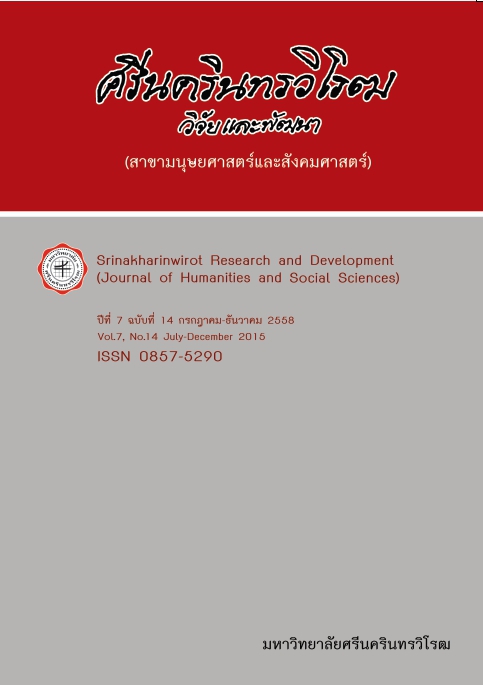แนวทางและมาตรการส่งเสริมการออมของผู้สูงอายุ ตามหลักปรัชญาเศรษฐกิจพอเพียง: กรณีศึกษาจังหวัดนนทบุรี APPROACHES AND MEASURES IN PROMOTING ELDER SAVING IN ACCORDANCE WITH PHILOSOPHY OF THE SUFFICIENCY ECONOMIC: A CASE STUDY OF NONTHABURI PROVINCE
Keywords:
การออม ผู้สูงอายุ เศรษฐกิจพอเพียง ความรู้ทางการเงิน การรับรู้ข่าวสารข้อมูลทางการเงินAbstract
บทคัดย่อ
การวิจัยนี้มีวัตถุประสงค์เพื่อ 1) สำรวจข้อมูลของผู้สูงอายุเกี่ยวกับสถานภาพการทำงานก่อนและหลังเกษียณ ภาวะการเงิน พฤติกรรมการออม ทัศนคติต่อการออม การปฏิบัติตนตามหลักปรัชญาเศรษฐกิจพอเพียง ความรู้ทางการเงิน การรับรู้ข่าวสารข้อมูลทางการเงิน และบทบาทของกลุ่มการออมในชุมชน 2) กำหนดแนวทางและมาตรการสำคัญระยะสั้นและระยะยาวในการส่งเสริมการออมของผู้สูงอายุ ที่สอดคล้องกับหลักปรัชญาของเศรษฐกิจพอเพียง 3) ทดลองนำมาตรการระยะสั้นไปดำเนินการผ่านโครงการอบรมเชิงปฏิบัติการความรู้การเงินขั้นพื้นฐานให้กลุ่มเป้าหมาย และประเมินผลสัมฤทธิ์ของมาตรการ รวบรวมข้อมูลจากกลุ่มตัวอย่างผู้สูงอายุ 1,000 คน การสัมภาษณ์เจาะลึกและระดมความคิดเห็นจากแกนนำผู้สูงอายุ ผู้สูงอายุในชุมชน ข้าราชการ
และผู้ทรงคุณวุฒิรวมจำนวน 30 ราย และ 58 ราย ตามลำดับ และกลุ่มตัวอย่างผู้สูงอายุที่เข้าร่วมโครงการอบรมทางการเงิน จำนวน 79 คน การวิเคราะห์ข้อมูลการสำรวจและผลสัมฤทธิ์ของโครงการอบรมวิเคราะห์โดยร้อยละ ค่าเฉลี่ย และส่วนเบี่ยงเบนมาตรฐาน
ผลการวิจัย พบว่า (1) สถานภาพการทำงานก่อนเกษียณที่สำคัญ 3 อันดับแรก คือ ข้าราชการ เกษตรกร
และประกอบธุรกิจส่วนตัว ซึ่งสอดคล้องกับสถานภาพหลังเกษียณที่สำคัญ 3 อันดับแรก คือไม่ได้ทำงาน ข้าราชการบำนาญ และเกษตรกร แหล่งรายได้ที่สำคัญคือ เบี้ยยังชีพและบำเหน็จบำนาญ กลุ่มตัวอย่างผู้สูงอายุส่วนใหญ่มีรายได้ รายจ่ายเฉลี่ยต่อเดือนไม่เกิน 9,000 บาท มีสินทรัพย์ และนิยมถือครองสินทรัพย์เป็นเงินสด
และที่ดิน มูลค่าการออมเฉลี่ยต่อเดือนต่ำกว่า 2,000 บาท นิยมเก็บออมเป็นเงินสด ไม่มีหนี้สิน มีทัศนคติดีมากเกี่ยวกับการออม ปฏิบัติตามหลักปรัชญาเศรษฐกิจพอเพียงในระดับปานกลาง มีความรู้ทางการเงิน และไม่ค่อยได้รับรู้ข่าวสารข้อมูลด้านการเงิน กลุ่มตัวอย่างส่วนใหญ่เป็นสมาชิกระบบการออมในชุมชน กลุ่มการออมในชุมชนมีบทบาทมากในการส่งเสริมการออมของผู้สูงอายุ (2) มาตรการระยะสั้นในการส่งเสริมการออม คือ การจัดโครงการอบรมผู้สูงอายุให้มีความรู้ความเข้าใจด้านการบริหารเงิน และเพิ่มการรับรู้ข่าวสารข้อมูลทางการเงิน
และมาตรการระยะยาว คือ การส่งเสริมให้ผู้สูงอายุมีรายได้เพิ่มจากการทำงาน (3) ในการประเมินผลสัมฤทธิ์ของมาตรการระยะสั้นพบว่า หลังการอบรม ผู้เข้าอบรม 1) ได้นำความรู้จากการอบรมไปประยุกต์ใช้ในด้านระมัดระวังการใช้จ่าย การทำบัญชีรายรับ-รายจ่าย การนำเงินออมไปลงทุน และการเพิ่มการออม 2) ได้นำความรู้ ประสบการณ์ ข่าวสารข้อมูลทางการเงินที่ได้รับจากการอบรมไปเผยแพร่ให้สมาชิกในครอบครัวและชุมชน
3) จำนวนผู้สูงอายุร้อยละ 65.80 มีการออมเพิ่มขึ้น จากเดิม ร้อยละ 1 – 10
Abstract
The main objectives of this research are: 1) to survey data on the elderly, in regard to pre- and post- retirement status, financial condition, saving behavior, attitude toward saving, sufficiency economy approach conduct, financial literacy and cognizance of financial information and news, and roles of community saving system 2) to determine key short-term and long-term measures in promoting saving by the elderly in accordance with philosophy of the Sufficiency Economy; 3) to test the recommended key short-term measure via arranging a basic financial training program for the target group, and evaluate its effectiveness. This research is an applied research. Data and information are collected from a survey sample of 1,000 elders in Nonthaburi; an in depth-interview and a focus group consist of elder leaders, community elders, government officials, and academicians totaling 30 and 58 samples respectively; and a sample of 79 elders participating in a financial training program. In analyzing field survey data and the effectiveness of the measure, statistical tools including percentage, arithmetic means, standard deviation are used (1) Field survey findings reveal the 3 most dominant pre-retirement status of elder samples: government officials, agricultural workers, and self-employed; which in accordance with the 3 most predominant post-retirement status: unemployed, retired government officials, and agricultural workers. The 2 most important sources of elder income include old-age government subsistence allowance, and gratuity and pension fund. Most elder samples have an average monthly income and expenditure each not in excess of ฿ 9,000. Most elder samples own assets in cash and land, and have monthly savings below ฿2,000 in cash as the most favorite form; and are not in debts. The majority of elders sampled have very good saving attitude; behave in accordance with the philosophy of the Sufficiency Economy at moderate level; command some financial literacy; and are not well informed in financial matters and news. Most elder samples are members of a community saving system. Community saving groups play an important role in promoting elder saving and provide welfare to. (2) A key short-term measure in promoting elder saving habits is arranging a training program to enhance the elderly ‘s financial literacy and increase their cognizance of financial information and news; and a key long-term measure is to encourage the elderly to work to increase their income. (3) In evaluating the effectiveness of the short-term measure after the training, the participant samples reveal: 1) applying financial knowledge and information obtained from the training program to prudent spending, carry out revenue – expenditure accounting constantly, invest and increase their savings. 2) sharing knowledge, experience, and information gained from the training with family and community members. 3) 65.80 % of samples has increased the saving rate from 1 to 10%Downloads
Downloads
Published
How to Cite
Issue
Section
License
Srinakharinwirot Research and Development Journal of Humanities and Social Sciences is licensed Under a Creative Commons Attribution-NonCommercial-NoDerivs 4.0 International (CC-BY-NC-ND 4.0) License, Unless Otherwise Stated. Please Read Journal Policies Page for More Information on Open Access, Copyright and Permissions.



